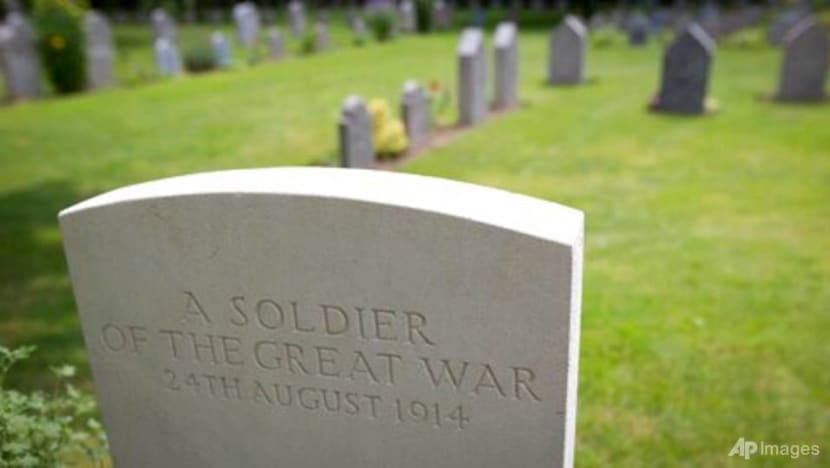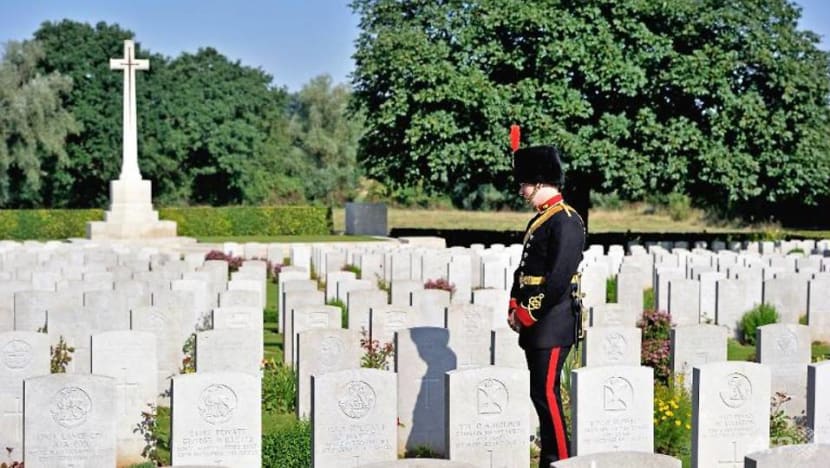Minority troops not honoured by UK due to 'pervasive racism': Study

The grave of an unknown Commonwealth World War I soldier at the St Symphorien Cemetery near Mons, Belgium, on Saturday, Jul 26, 2014. (File photo: AP/Virginia Mayo)
LONDON: More than 100,000 African and ethnic minority soldiers who died fighting for the British Empire in World War I were not properly commemorated due to "pervasive racism", according to a report released on Thursday (Apr 22).
The Commonwealth War Graves Commission (CWGC) apologised after an investigation found that the fallen personnel "were not commemorated by name or possibly not commemorated at all", adding that the number treated unfairly could be as high as 350,000 soldiers.
Defence Secretary Ben Wallace was due to address the report's findings in parliament on Thursday.
The report comes as Britain reckons with the legacy of its colonial past and links to slavery, against a backdrop of anti-racism and Black Lives Matter protests.
Last month, there was a backlash at a government-commissioned report which concluded that prejudice persists, but that the country is not "institutionally racist", enraging equality campaigners.
The CWGC said the failure to honour the troops was "influenced by a scarcity of information, errors inherited from other organisations and the opinions of colonial administrators".
"Underpinning all these decisions, however, were the entrenched prejudices, preconceptions and pervasive racism of contemporary imperial attitudes," it said.
It cited a 1923 conversation between Brigadier-General Gordon Guggisberg, the then governor of British-controlled Gold Coast (modern-day Ghana), and the commission's Arthur Browne.
Guggisberg said "the average native ... would not understand or appreciate a headstone", as he argued for collective memorials without individual names.
The CWGC was set up during World War I to remember Britain's war dead. It cares for war graves at 23,000 locations in more than 150 countries, commemorating nearly 1.7 million people.

"EQUALITY OF TREATMENT IN DEATH"
The Imperial War Graves Commission (IWGC), which became the CWGC, was founded on the principle of "equality of treatment in death", regardless of rank, class, religion or provenance.
But while that aim was achieved in Europe, "the promise of equality had limits elsewhere" where there was fighting during the conflict, the report said.
"In conflict with the organisation's founding principles, it is estimated that between 45,000 and 54,000 casualties (predominantly Indian, East African, West African, Egyptian and Somali personnel) were commemorated unequally," it said.
"For some, rather than marking their graves individually, as the IWGC would have done in Europe, these men were commemorated collectively on memorials.
"For others who were missing, their names were recorded in registers rather than in stone.
"A further 116,000 casualties (predominantly, but not exclusively, East African and Egyptian personnel) - but potentially as many as 350,000 - were not commemorated by name or possibly not commemorated at all."
The CWGC acknowledged that it had "failed to fully carry out its responsibilities at the time and accepts the findings and failings identified in this report and we apologise unreservedly for them".
CWGC director general Claire Horton said: "The events of a century ago were wrong then and are wrong now.
The study was set up following a documentary on the issue by David Lammy, a main opposition Labour lawmaker, who is the party's spokesman on justice.
"No apology can ever make up for the indignity suffered by The Unremembered," he wrote on Twitter.
"However, this apology does offer the opportunity for us as a nation to work through this ugly part of our history - and properly pay our respects to every soldier who has sacrificed their life for us."












